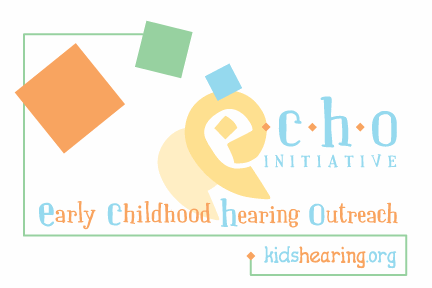
Contact
The ECHO Initiative
Jan Buhrmann
echo.ncham@usu.edu
303-503-0858
When
Tuesday, March 6, 2018
1:00 - 2:00 p.m. Eastern
12:00 - 1:00 p.m. Central
11:00 a.m. - 12:00 p.m. Mountain
10:00 - 11:00 a.m. Pacific
9:00 - 10:00 a.m. Alaska
8:00 - 9:00 a.m. Hawaii
Implementing Evidence-Based
Hearing Screening Practices for Children
Three to Five Years of Age in Head Start Programs

Early Childhood Hearing Outreach (ECHO) Initiative
Tuesday, March 6, 2018
1:00 - 2:00 p.m. Eastern
12:00 - 1:00 p.m. Central
11:00 a.m. - 12:00 p.m. Mountain
10:00 - 11:00 a.m. Pacific
9:00 - 10:00 a.m. Alaska
8:00 - 9:00 a.m. Hawaii
Evidence-base hearing screening can be provided to children 3-5 years of age using either the Otoacoustic Emissions (OAE) or Pure Tone screening method. Although the Pure Tone screening method has been used with children for many decades, it is not a simple procedure for lay screeners to implement accurately in early childhood care and education settings.
In contrast to OAE screening, Pure Tone screening is not automated. It requires screeners to rigorously limit noise in the environment, assess each child's capacity to follow instructions and produce consistent behavioral responses, manually operate an audiometer, and maintain child compliance in order to yield reliable outcomes. Children not passing Pure Tone screening must then receive appropriate follow-up that also requires adherence to a specific protocol.
Please join us for this Webinar. Learn about evidence-based hearing screening for children 3-5 years of age and newly released instructional resources designed to assist those using Pure Tone screening to implement this procedure in a valid and reliable manner.
Topics for the webinar include:
- The importance of periodic early childhood hearing screening
- Current evidence-based options for conducting hearing screening
- Screening components: choosing appropriate screening environments, preparing children, steps for completing the screening process
- Follow-up protocol for children not passing the hearing screening
- How to find a local audiologist to assist in program development, training and diagnostic services
- Resources available for training and technical assistance
Who should attend?
This webinar is will be valuable for Head Start, Migrant and Seasonal, and American Indian/Alaska Native grantees serving children 3-5 years of age.
For questions or additional information, contact:
The ECHO Initiative
Jan Buhrmann
303-503-0858
echo.ncham@usu.edu